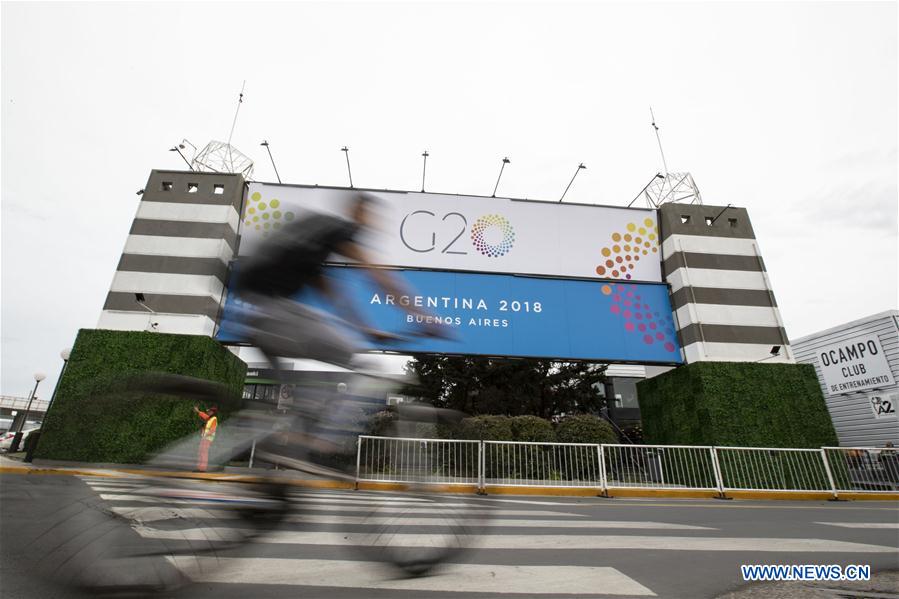Road blocks at upcoming G20 summit
- By Sajjad Malik
 0 Comment(s)
0 Comment(s) Print
Print E-mail China.org.cn, November 29, 2018
E-mail China.org.cn, November 29, 2018

Ahead of this week's G20 summit in Argentina, there is much trepidation that yet another high-profile meeting of world leaders may end in disappointment. The feeling stems from the squabbles witnessed at the Asia-Pacific Economic Summit (APEC) in Port Moresby when for the first time in the history of the grouping, the leaders failed to agree on a joint communique.
Discord between the U.S. and China, the world's two largest economies, dominated the APEC summit, and overshadowed the multilateral gatherings. It may only be a matter of time before the ramifications of this trade dispute disrupt the entire global economy to the disadvantage of all.
At the heart of the tension is the US$375 billion trade deficit in favor of China, which U.S. President Donald Trump is trying to reduce through strong-arm tactics, instead of improving his own county's industrial output and diplomatic outreach. He has already imposed tariffs of US$250 billion on Chinese imports and has signaled that he is likely to impose an additional US$267 billion of tariffs in the near future.
Trump is trying to force China to give in to his demands and is taking measures to reduce the deficit. He has asked for better market access, protection of intellectual property for American firms and a reduction on industrial subsidies.
The Chinese authorities have stated on numerous occasions that they are willing to expand market access, lower tariffs and import more from overseas. China recently hosted thousands of foreign companies at the first ever China International Import Expo (CIIE) with the objective of helping others increase their sale of goods in China. Moreover, Beijing has said it is committed to opening up and globalizing in an organized and phased manner, which means the country has in principle accepted U.S. demands for greater market access and it is only matter of time.
China is mindful of U.S. plan to come up with additional tariffs at the start of next year, as already threatened by Trump. If no progress is made, the U.S. tariff rate on US$200 billion Chinese goods will go up to 25 percent from 10 percent on January 1.
This would be truly detrimental for the world economy. Independent bodies such as the Organization for Economic Cooperation and Development (OECD) have warned of consequences of escalation, saying that it will impede global economic growth and inflict harm upon all nations.
China as a rising economy is trying to avoid an unnecessary showdown. It is not only willing to sit down with U.S. to negotiate but is also insistent that it wants to avoid a repeat of the incidents at Asia-Pacific Economic Cooperation summit. Vice Minister of Commerce Wang Shouwen recently said that China does not wish to see a repeat of the APEC failure at the G20.
However, the challenges of G20 are even bigger, as the leaders of world's twenty leading economies are scheduled to discuss issues related to global trade and climate change. Unfortunately, the United States is standing in direct opposition on both issues, as compared to the rest of the world.
Efforts are going on before the start of the summit to pave way for a common communique at the end of the two-day meeting, but it is not easy, given the polarization brought about by Trump's "America First" policies. In May, the G7 meeting also ended in acrimony due to differences between Trump and rest of participants led by Germany.
The G20 with its wider representation from the emerging markets of Asia is more complex and is never easy to balance the interests of all participants. But stakes are high and leaders will not like to return home carrying failure on shoulders. Hence, it is more likely that a watered down version of joint statement will be agreed even if no tangible progress is made on key matters.
Sajjad Malik is a columnist with China.org.cn. For more information please visit:
http://www.shenbo75.com/opinion/SajjadMalik.htm
Opinion articles reflect the views of their authors, not necessarily those of China.org.cn.





